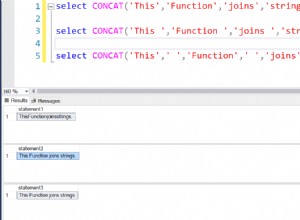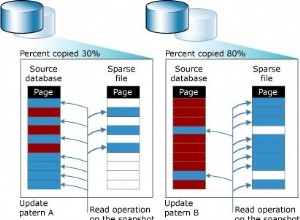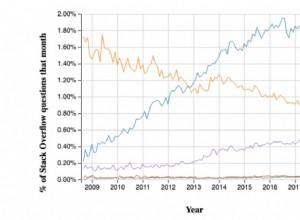Ho anche bloggato su questo problema qui. Ecco uno snippet che illustra come farlo:
try (CallableStatement call = c.prepareCall(
"declare "
+ " num integer := 1000;" // Adapt this as needed
+ "begin "
// You have to enable buffering any server output that you may want to fetch
+ " dbms_output.enable();"
// This might as well be a call to third-party stored procedures, etc., whose
// output you want to capture
+ " dbms_output.put_line('abc');"
+ " dbms_output.put_line('hello');"
+ " dbms_output.put_line('so cool');"
// This is again your call here to capture the output up until now.
// The below fetching the PL/SQL TABLE type into a SQL cursor works with Oracle 12c.
// In an 11g version, you'd need an auxiliary SQL TABLE type
+ " dbms_output.get_lines(?, num);"
// Don't forget this or the buffer will overflow eventually
+ " dbms_output.disable();"
+ "end;"
)) {
call.registerOutParameter(1, Types.ARRAY, "DBMSOUTPUT_LINESARRAY");
call.execute();
Array array = null;
try {
array = call.getArray(1);
System.out.println(Arrays.asList((Object[]) array.getArray()));
}
finally {
if (array != null)
array.free();
}
}
Quanto sopra verrà stampato:
[abc, hello, so cool, null]
Nota che il ENABLE / DISABLE l'impostazione è un'impostazione a livello di connessione, quindi puoi farlo anche su diverse istruzioni JDBC:
try (Connection c = DriverManager.getConnection(url, properties);
Statement s = c.createStatement()) {
try {
s.executeUpdate("begin dbms_output.enable(); end;");
s.executeUpdate("begin dbms_output.put_line('abc'); end;");
s.executeUpdate("begin dbms_output.put_line('hello'); end;");
s.executeUpdate("begin dbms_output.put_line('so cool'); end;");
try (CallableStatement call = c.prepareCall(
"declare "
+ " num integer := 1000;"
+ "begin "
+ " dbms_output.get_lines(?, num);"
+ "end;"
)) {
call.registerOutParameter(1, Types.ARRAY, "DBMSOUTPUT_LINESARRAY");
call.execute();
Array array = null;
try {
array = call.getArray(1);
System.out.println(Arrays.asList((Object[]) array.getArray()));
}
finally {
if (array != null)
array.free();
}
}
}
finally {
s.executeUpdate("begin dbms_output.disable(); end;");
}
}
Nota anche che questo recupererà una dimensione fissa di 1000 righe al massimo. Potrebbe essere necessario eseguire il loop in PL/SQL o eseguire il polling del database se si desidera più righe.
Una nota sulla chiamata a DBMS_OUTPUT.GET_LINE invece
In precedenza, c'era una risposta ora eliminata che suggeriva singole chiamate a DBMS_OUTPUT.GET_LINE invece, che restituisce una riga alla volta. Ho valutato l'approccio confrontandolo con DBMS_OUTPUT.GET_LINES e le differenze sono drastiche:fino a un fattore 30 volte più lento quando viene chiamato da JDBC (anche se non c'è davvero una grande differenza quando si chiamano le procedure da PL/SQL).
Quindi, l'approccio per il trasferimento di dati in blocco utilizzando DBMS_OUTPUT.GET_LINES ne vale sicuramente la pena. Ecco un link al benchmark:
https://blog.jooq.org/2017/12/18/the-cost-of-jdbc-server-roundtrips/




